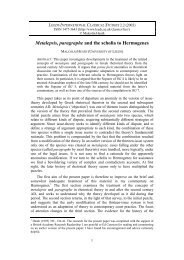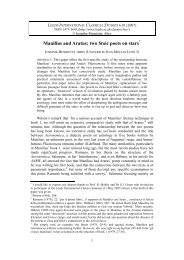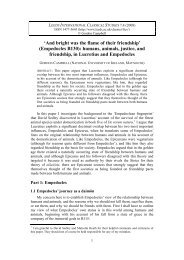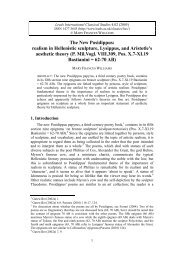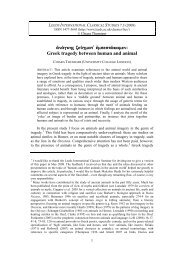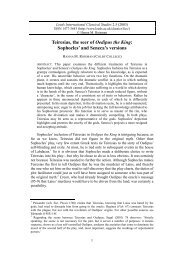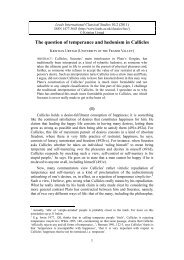Revisiting Tarpeia's myth in Propertius (IV, 4) - Leeds International ...
Revisiting Tarpeia's myth in Propertius (IV, 4) - Leeds International ...
Revisiting Tarpeia's myth in Propertius (IV, 4) - Leeds International ...
Create successful ePaper yourself
Turn your PDF publications into a flip-book with our unique Google optimized e-Paper software.
MYRTO GARANI, REVISITING TARPEIA’S MYTH IN PROPERTIUS (<strong>IV</strong>, 4)<br />
vie with Alp<strong>in</strong>e cold, did not yield <strong>in</strong> heat to fire itself! The two gate-posts<br />
smoked with the hot fumes; and the gate, which had been opened (but now <strong>in</strong><br />
va<strong>in</strong>) to the hardy Sab<strong>in</strong>es, was made impassable by the new founta<strong>in</strong>, until the<br />
Roman soldiery could arm themselves.<br />
By reestablish<strong>in</strong>g the balance between water and fire, Ovid <strong>in</strong>s<strong>in</strong>uates the power<br />
of cosmic Love which eventually br<strong>in</strong>gs harmony. In the end, Romulus decides to<br />
end the war <strong>in</strong> peace and it is agreed that Tatius will share with him the regal<br />
throne. In other words, while <strong>in</strong> <strong>Propertius</strong> Tarpeia’s elegiac love is proved<br />
<strong>in</strong>adequate as a factor of peace, Ovid <strong>in</strong> a way fulfils the hero<strong>in</strong>e’s aspiration by<br />
resort<strong>in</strong>g to Venus, the latter, however, be<strong>in</strong>g the equivalent to cosmic Love. Ovid<br />
substitutes a witty apostrophe to Alp<strong>in</strong>e waters (Met. 14.794-5) for <strong>Propertius</strong>’<br />
correspond<strong>in</strong>g apostrophe towards Vesta (quae voluit flammas fallere, Vesta, tuas,<br />
<strong>IV</strong>.4.18), thereby counterbalanc<strong>in</strong>g the latter’s pr<strong>in</strong>ciple of Strife with that of<br />
Love. Last but not least, as Barchiesi remarks, ‘Ovid’s sulphurous spr<strong>in</strong>gs may<br />
well represent a propitious and pacific adaptation of the s<strong>in</strong>ister sulphurous water<br />
<strong>in</strong> which Ennius’ <strong>in</strong>fernal Discordia dwelt (cf. fr. 222 Sk. sulpureas... Naris ad<br />
undas)’; 54 this <strong>in</strong>tertextual <strong>in</strong>version strengthens the Empedoclean echo <strong>in</strong> the<br />
Ovidian context. Accord<strong>in</strong>gly <strong>in</strong> Ovid’s Fasti, war is avoided by the union of<br />
water with fire which suggests the pacific power of Love (Fasti 1.267-72): 55<br />
cum tanto veritus committere num<strong>in</strong>e pugnam,<br />
ipse meae movi callidus artis opus,<br />
oraque, qua pollens ope sum, fontana reclusi<br />
sumque repent<strong>in</strong>as eiaculatus aquas; 270<br />
ante tamen madidis subieci sulpura venis,<br />
clauderet ut Tatio fervidus umor iter.<br />
Fear<strong>in</strong>g to engage <strong>in</strong> fight with so redoubtable a deity, I slyly had recourse to a<br />
device of my own craft, and by the power I wield I opened the founta<strong>in</strong>s’ mouths<br />
and spouted out a sudden gush of water; but first I threw sulphur <strong>in</strong>to the water<br />
channels, that the boil<strong>in</strong>g liquid might bar the way aga<strong>in</strong>st Tatius.<br />
What are, then, the implications of Ovid’s reveal<strong>in</strong>g <strong>Propertius</strong>’ weird<br />
flirtation with Neopythagorean/Empedoclean ideas, which are otherwise alien to<br />
the world of elegy, be it erotic or aetiological? To beg<strong>in</strong> with, the lurk<strong>in</strong>g<br />
philosophical undertones <strong>in</strong>ject the figure of Vesta, already open to question, with<br />
further ambiguities, which deceive the expectations of both the hero<strong>in</strong>e and the<br />
reader about Vesta’s role. Early <strong>in</strong> the elegy the narrator apostrophizes the goddess<br />
and po<strong>in</strong>ts to the hero<strong>in</strong>e as one who wanted to cheat the latter’s flames (quae<br />
voluit flammas fallere, Vesta, tuas, <strong>IV</strong>.4.18). 56 In l<strong>in</strong>e with this, the reader <strong>in</strong>itially<br />
expects an overturn<strong>in</strong>g <strong>in</strong> the established balance of the relationship between<br />
Tarpeia and Vesta <strong>in</strong> favor of the former. Yet fallere is exactly the verb that Vergil<br />
had used for Venus’ and Juno’s actions (Aen. 1.688, 7.350). In l<strong>in</strong>e with her<br />
54 Barchiesi (1991-1992) 15-16.<br />
55 For a similar creative battle and reconciliation of Empedoclean elements with correspond<strong>in</strong>g<br />
connotations see <strong>in</strong> Ovid’s Fasti the account of Fordicidia (4.629-72), the account of Parilia<br />
(4.783-806), and the story of Romulus and Remus (4.808-62), with further discussion <strong>in</strong> Garani<br />
(forthcom<strong>in</strong>g b).<br />
56 Heyworth (2007a) places this l<strong>in</strong>e after 86, but he keeps the number<strong>in</strong>g of the l<strong>in</strong>es.<br />
16



